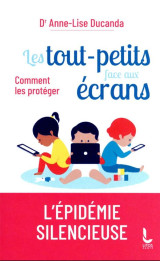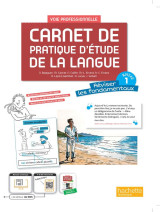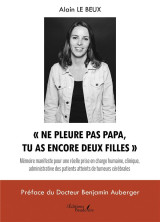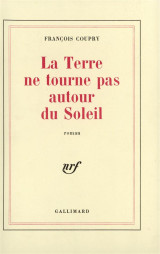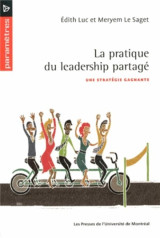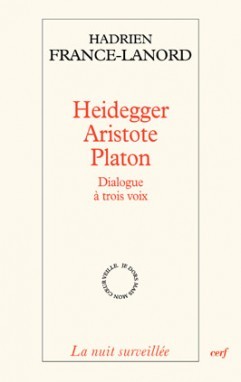
Heidegger, aristote et platon
C'est la question de la parole qui est ici en jeu, telle que Heidegger l'a méditée pour préparer la pensée à un « commencement autre » que le commencement grec. À cette fin, Heidegger a mené à l'époque de « Être et temps » un dialogue très intense avec Aristote. Ce qu'a d'exceptionnel cette rencontre, qui a marqué toute une génération d'élèves (notamment H.-G. Gadamer, H. Arendt, L. Strauss), est ici présenté de manière générale. Mais certains axes sont précisés, à travers notamment la découverte que fait Heidegger du sens que recèle la « quotidiennet? pour l'existence humaine. À partir de cette dimension immédiatement concrète qui a toujours échappé aux grandes visées métaphysiques, Heidegger voit poindre, en dialogue avec Aristote, une entente de la parole comme modalité éminente du rapport à autrui. Quant au débat que Heidegger a mené avec Platon, il est aussi présenté dans ses grands traits, à travers la notion de « dialogue », si chère à l'un et l'autre penseur. C'est ici le sens de la parole philosophique qui est en question, à la lumière de la tâche que Heidegger lui confère, en notre époque de nihilisme accompli, d'un voisinage avec la parole poétique. S'appuyant sur de nombreux cours de Heidegger désormais publiés, mais peu connus, le présent livre offre également plusieurs extraits inédits en français d'un texte appartenant au corpus — encore inconnu des lecteurs français — que constituent les « Traités impubliés » rédigés par le penseur pendant la guerre, à l'abri de toute publicité. Ce texte sur les rapports entre poésie et philosophie permet de mesurer toute la portée éthique de l'habitation qu'aura ménagée Heidegger pour être poétiquement humain.
--
The word is the subject of this book, as it was the subject of Heidegger's meditation in preparation for thinking a ‘beginning other' than the Greek. To this end, at the period of ‘Being and Time', Heidegger held an intense dialogue with Aristotle. What is exceptional about this encounter, which was to mark a whole generation of pupils (especially H.-G. Gadamer, H. Arendt, L. Strauss), is presented here in a general way. But certain points are studied in detail, particularly the discovery Heidegger made of the meaning behind ‘everydayness' in human existence. From that immediately concrete dimension, which has always escaped great metaphysical projects, Heidegger sees, in the dialogue with Aristotle, the emergence of an understanding of the word as an imminent modality of the relation with the other. As for the debate Heidegger held with Plato, it is also presented in its main lines through the notion of ‘dialogue' so dear to both philosophers. In this book, the subject is the meaning of the philosophical word, in the light of the task Heidegger imposed on it, close to the poetic word in our epoch of consummate nihilism. Based on many lectures given by Heidegger, now published but little-known, this book also includes several excerpts previously unpublished in French of a text belonging to the corpus that goes under the title ‘Unpublished treatises' written by the philosopher during the war and never publicised. This study will bring readers greater understanding of what the philosopher had to say about man's vocation to live poetically in the world.
--
The word is the subject of this book, as it was the subject of Heidegger's meditation in preparation for thinking a ‘beginning other' than the Greek. To this end, at the period of ‘Being and Time', Heidegger held an intense dialogue with Aristotle. What is exceptional about this encounter, which was to mark a whole generation of pupils (especially H.-G. Gadamer, H. Arendt, L. Strauss), is presented here in a general way. But certain points are studied in detail, particularly the discovery Heidegger made of the meaning behind ‘everydayness' in human existence. From that immediately concrete dimension, which has always escaped great metaphysical projects, Heidegger sees, in the dialogue with Aristotle, the emergence of an understanding of the word as an imminent modality of the relation with the other. As for the debate Heidegger held with Plato, it is also presented in its main lines through the notion of ‘dialogue' so dear to both philosophers. In this book, the subject is the meaning of the philosophical word, in the light of the task Heidegger imposed on it, close to the poetic word in our epoch of consummate nihilism. Based on many lectures given by Heidegger, now published but little-known, this book also includes several excerpts previously unpublished in French of a text belonging to the corpus that goes under the title ‘Unpublished treatises' written by the philosopher during the war and never publicised. This study will bring readers greater understanding of what the philosopher had to say about man's vocation to live poetically in the world.
Disponible sous 3/4 jours
Quantité en stock : 0
EAN
9782204092210
Éditeur
CERF

Où nous trouver ?
La Griffe Noire
2 Rue de la Varenne94100 St Maur-des-fossés
La Griffe Noire BD
11 Rue de la Varenne94100 St Maur-des-fossés
Horaires d'ouverture
Lundi au samedi : 9h à 19h
Dimanche : 10h30 à 13h
La Griffe Noire : 01 48 83 67 47
La Griffe Noire BD : 01 48 89 13 88
Contact
contact@lagriffenoire.com
0148836747


